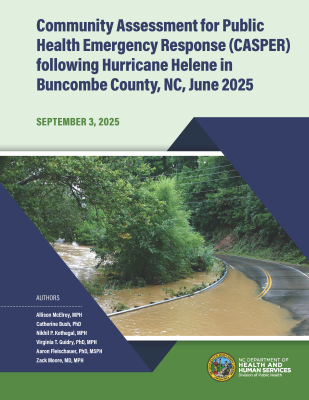Community Assessment for Public Health Emergency Response (CASPER)
Following Hurricane Helene in Buncombe County, NC, June 2025
In June 2025, Buncombe County Health and Human Services - Division of Public Health (BCHHS-DPH) and the North Carolina Department of Health and Human Services (NCDHHS) surveyed 210 randomly chosen households in a Community Assessment for Public Health Emergency Response (CASPER) survey. The goals of the CASPER survey were to understand ongoing community needs and health effects eight months after Hurricane Helene hit western NC.
Hurricane Helene caused severe damage and loss of life in Buncombe County:
- 43 lives were lost (40% of the 107 storm-related deaths in NC)
- Homes and roads were destroyed
- Public health services like water, sewer, electricity and communications systems were disrupted

Stories from Hurricane Helene - in the aftermath of a disaster, NC Public Health heeded the call
Spread the Word About NC Public Health - flyers, videos and social media graphics to share essential roles public health plays every day
Key Findings about Ongoing Needs
- This was the most common need reported
- 45.7% of households had new or worse symptoms after Hurricane Helene:
- Anxiety: 34.9%
- Depressed mood: 24.5%
- Trouble sleeping: 19.7%
- Difficulty concentrating: 17.6%
- Feeling alone/isolated: 9.4%
- Other issues included:
- Increased alcohol/drug use: 8.2%
- Feeling numb: 6.2%
- Nearly 18% (17.6%) of households needed help for behavioral health concerns but did not get it
- 7.9% of households had trouble getting health care after Hurricane Helene
- Main reasons:
- Clinic closed or health care providers not available: 27.3%
- Insurance problems: 24.7%
- Money/cost: 15.2%
- No transportation: 8.3%
- No child care: 3%
- No cellphone/internet access: 3%
- 38% of households evacuated some or all household members
- Reasons households said they did not evacuate:
- Did not need to evacuate: 33.9%
- Did not believe it was necessary: 24.3%
- Did not receive evacuation alerts or warnings: 8.5%
- Roads blocked or damaged: 7%
- Concern about leaving property: 6.1%
- Concern about leaving pets: 5.5%
- 55.9% of households reported some home damage from Helene
- Eight months after the hurricane:
- Nearly one-third (30.8%) of homes were repaired
- 12.4% were somewhat repaired
- 9.5% were not repaired at all
- Debris removal was still a problem eight months after the hurricane:
- 31.5% of households had no debris removed
- 8.8% of households had only some debris removed
- 41.1% of households received assistance from the Federal Emergency Management Agency (FEMA)
- 16.7% tried but were not successful
- Other aid sources received by households included:
- Nonprofit organizations: 19.6%
- Church groups: 19.5%
- State or local government: 9.0%
- Other sources: 4.2%
Several ongoing concerns about environmental exposures were reported.
- Household Water Quality:
- 21.3% did not feel their source of tap water was safe at the time of the survey
- Surveyed households used more bottled water and less municipal water even though this service was fully restored
- Private Well Testing:
- 76 households used a private or shared well as their main source of drinking water before Hurricane Helene
- Only one reported their well had flooded immediately after the hurricane, and it was tested and treated
- Households with private wells had broad interest in well testing kits
- Mold:
- 14.3% saw mold or smelled musty odors in their home after the hurricane
- Of those, 61.5% still had mold or odors eight months later (June 2025)
- Barriers to mold remediation included cost and unresponsive landlords for renters
Recommendations
- Expand access to coordinated, whole-person health care, with focused investment in behavioral health resources.
- Partner with community organizations to strengthen awareness of emergency preparedness knowledge and resources.
- Develop and implement a comprehensive environmental health education initiative that includes linking the community to resources.
